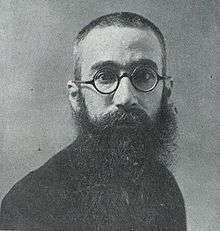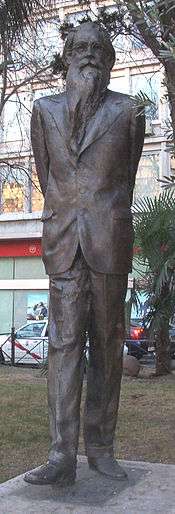Ramón del Valle-Inclán
| Valle-Inclán | |
|---|---|
 Valle-Inclán, photographed by Pau Audouard in 1911 | |
| Born |
Ramón María del Valle-Inclán 28 October 1866 Vilanova de Arousa, Pontevedra |
| Died |
5 January 1936 (aged 69) Santiago de Compostela |
| Occupation | Dramatist and novelist |
| Language | Spanish |
| Nationality | Spanish |
| Genres | |
| Literary movement | |
| Spouse | Josefa María Ángela Blanco Tejerina |
| Children |
6
|

Ramón María del Valle-Inclán y de la Peña (in Vilanova de Arousa,[1] Galicia, Spain, 28 October 1866 – Santiago de Compostela, 5 January 1936) was a Spanish dramatist, novelist and member of the Spanish Generation of 98. He is considered perhaps the most noteworthy and certainly the most radical dramatist working to subvert the traditionalism of the Spanish theatrical establishment in the early part of the 20th century. His drama is made all the more important by its influence on later generations of Spanish dramatists. His statue in Madrid therefore receives the homage of the theatrical profession on the national theater day.
Works
His early writings were in line with French symbolism and modernism; however, his later evolution took his works to more radical formal experiments. He despised literary realism and openly disregarded Benito Pérez Galdós, its most prominent Spanish representative.[2] His political views, accordingly, changed from traditional absolutism (in Spain known as Carlismo) towards anarchism. This also caused him problems.
All his life he struggled to live up to his bohemian ideals, and stayed loyal to his aestheticist beliefs. However, he had to write undercover for serialised popular novels. During a row with a fellow writer his wrist was wounded and became infected, and he lost his arm.
Valle-Inclán's work (for example, Divine Words (Divinas palabras) and Bohemian Lights (Luces de Bohemia) attacks what he saw as the hypocrisy, moralising and sentimentality of the bourgeois playwrights, satirises the views of the ruling classes and targets in particular concepts such as masculine honour, militarism, patriotism and attitudes to the Crown and the Roman Catholic Church. His drama also featured irreverent portrayal of figures from Spain's political past and deployed crude, obscene language and vulgar imagery in a mocking attack on theatrical blandness.
In addition to being politically subversive, though, Valle-Inclán's plays often required staging and direction that went far beyond the abilities of many companies working in the commercial theatre, often featuring complex supernatural special effects and rapid, drastic changes of scene. For this reason, some of his works are regarded as closet dramas.
Valle-Inclán also wrote major novels including the Tyrant Banderas (Tirano Banderas), which was influential on the Latin American 'dictator' novel (for example, I, the Supreme by Augusto Roa Bastos), although it was received with disdain by many Spanish American authors, Rufino Blanco Fombona for example, pokes fun of "the America of tambourine" ("la América de pandereta") of that novel where you could be in the jungle one day and the Andes the next. Some critics view him as being the Spanish equivalent to James Joyce; however, due to a lack of translations his work is still largely unknown in the English-speaking world, although his reputation is slowly growing as translations are produced.
Works available in English
Plays
- Divine Words
- Bohemian Lights
- Savage Acts. Four Plays
- Silver Face
Prose
- Tyrant Banderas
- The Pleasant Memoirs of the Marquis de Bradomín
- Spring and Summer Sonatas
- Autumn and Winter Sonatas
- Mr Punch the Cuckold
- The Lamp of Marvels
- La pipa dfuma
Further reading
- Francisco Madrid, La vida altiva de Valle-Inclán, Buenos Aires, Poseidón, 1943.
- Robert Lima, Ramón del Valle-Inclán, New York, Columbia University Press, 1972.
- Robert Lima, Valle-Inclán: The Theatre of His Life, Columbia, University Press of Missouri, 1988.
- Manuel Vázquez Montalbán, Scenes from World Literature and Portraits of Greatest Authors, illustrated by Willi Glasauer, Barcelona, Spain, Círculo de Lectores, 1988.
- Robert Lima, Valle-Inclán: El teatro de su vida, Santiago de Compostela—Vigo, Editorial Nigra, 1995.
- María Fernanda Sánchez Colomer Ruiz, Valle-Inclán Orador, Doctoral Thesis, Departament de Filolgia Espanyola, Universitat Autonoma de Barcelona, 2002.
- Manuel Aznar Soler y Ma. Fernanda Sánchez Colomer, eds. Valle-Inclán en el siglo XXI, Proceedings from the Second International Congress, November 20–22, 2002 at the Universitat Autonoma de Barcelona.
- Robert Lima, The Dramatic World of Valle-Inclán, Woodbridge, England, Tamesis, 2003.
- Robert Lima, The International Bibliography of Studies on the Life and Works of Ramón del Valle-Inclán, Pennsylvania State University, The Orlando Press, 2008.
See also
References
- ↑ G., A. (October 25, 2014). ""Cuadrante" profundiza en los orígenes de Valle-Inclán y ahora se presenta en Roma". Faro de Vigo (in Spanish). Vilanova. Retrieved February 14, 2018.
Hace quince años nació la revista Cuadrante, un proyecto monográfico centrado en divulgar la obra y la biografía del mayor genio nacido en Vilanova de Arousa, Ramón María del Valle-Inclán.
- ↑ Gilman, Stephen (1961). "La palabra hablada y "Fortunata y Jacinta"" (PDF). Nueva revista de filología hispánica. 15 (3/4): 542–560. doi:10.24201/nrfh.v15i3/4.391. JSTOR 40297550.
External links
| Wikimedia Commons has media related to Ramón del Valle-Inclán. |
- Works by Ramón del Valle-Inclán at Project Gutenberg
- Works by or about Ramón del Valle-Inclán at Internet Archive
- Works by Ramón del Valle-Inclán at LibriVox (public domain audiobooks)

- Curiosities about Valle-Inclán
- Review of the play "Divinas palabras" by Spain's Centro Dramático Nacional in the New York Times, 2007
- House-Museum in A Pobra do Caramiñal
- House-Museum in Vilanova de Arousa